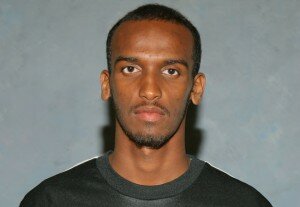Charges dropped in shooting of Augsburg student
 by Laura Yuen, Minnesota Public Radio — St. Paul, Minn. — A teenager charged with fatally shooting a Somali-American college student in Minneapolis eight months ago has been released from jail. The student’s family says prosecutors moved to dismiss the case because key witnesses were not willing to testify.
by Laura Yuen, Minnesota Public Radio — St. Paul, Minn. — A teenager charged with fatally shooting a Somali-American college student in Minneapolis eight months ago has been released from jail. The student’s family says prosecutors moved to dismiss the case because key witnesses were not willing to testify.
Prosecutors told family members of Ahmednur Ali that they didn’t have enough evidence to bring his suspected killer, 17-year-old Ramadan Sheikh-Osman, to trial.
Ali was shot last September outside the Brian Coyle Community Center in Minneapolis. Ali, a third-year political science major at Augsburg College, was working his first day on the job as a youth mentor.

Ramadan Sheikh-Osman
Authorities told Ali’s siblings that the shooter killed their brother because Ali wouldn’t let the teenage shooter play basketball.
Now eight months after his death, Ali’s family is grieving again.
“They see this was not justice, or justice was not served,” said Hassan Mohamud, the family’s imam.
“We, as the community, are asking whether the government used all the resources available to convict the suspect,” Mohamud said. “We are expecting one day the police will give enough information to the family and the community as to what happened to this case.”
Mohamud says Ali’s parents and siblings were anxiously awaiting the murder trial. Jury selection was scheduled to begin this week. But instead, the family learned that Sheikh-Osman would be set free.
Mohamud wouldn’t say what prosecutors discussed in private meetings with Ali’s family this week. But two of Ali’s siblings told Minnesota Public Radio News that key witnesses were not cooperating with authorities.
They said one is believed to have fled to Phoenix, Ariz., and another has changed his story. They think the witnesses fear retribution from Somali gangs.
The shooting took place in the Cedar-Riverside neighborhood of Minneapolis, which has the nation’s highest concentration of Somali-Americans.
Residents are on edge about the coming of summer, and the perennial uptick in crime. Warsame Warsame, 25, says he’s worried about keeping his son safe.
“These streets are crazy, man. Life is hard living here,” said Warsame. “Lot of people killing each other over dumb (things) — tribe, whatever, gangs, color. It don’t matter.”
Minneapolis police ran into roadblocks when they began investigating Ahmednur Ali’s murder last fall. The department hired Officer Jeanine Brudenell to be a full-time liaison to the Somali community. Since December 2007, eight young Somali men have been killed in the Twin Cities.
Brudenell says she has been trying to win the trust of Somali-Americans, but it has been challenging.
“There are a lot of people in the community who are being victimized and haven’t reported because they’re afraid, or fearful,” said Brudenell. “They’re not sure if they can trust us because of their experience with law enforcement in Somalia and in Kenya.”
Brudenell says many native Somalis are also confused — and even frustrated — that the police aren’t doing more to keep criminals off the streets.
“Their assumption is, ‘Well, you know who did it. Why aren’t you arresting him?’ And you and I both know it takes a lot of evidence to arrest somebody for a crime,” said Brudenell.
The imam, Hassan Mohamud, says he’s using his pulpit to encourage anyone with information on Ali’s murder to share what they know with police. He says if he can’t convince witnesses of their civic obligations, he can convince them of their religious duties.
“The Muslim community must come forward,” he said. “I’m coming from a religious perspective, which means if you don’t do this, you’re committing a major sin,” he said.
The public defenders representing Sheikh-Osman did not return calls seeking comment. He was 16 when the shooting occured and was to be tried as an adult.
Ahmednur Ali seemed to be on a path that would transcend the violence in his community. While growing up in Rochester and Columbia Heights, he played soccer and taught himself how to read and write Somali. He even created a Facebook page announcing his plans to run for the presidency of Somalia, hoping he could reunite his homeland.
At Augsburg, he helped create the Muslim Students Association and played soccer during his first year at the school.
Augsburg President Paul Pribbenow says Ali had an impact on the college, and the fact that he was tutoring young children when he was slain shows how much he cared for his community.
“Our concern is justice be done for Nur and his family,” said Pribbenow. “We want to know that officials are all doing what they can to come up with the evidence to find who murdered Nur.”
Staff at the Brian Coyle community center want to make sure nothing like this happens again, said the center’s director, Jennifer Blevins. They have installed 16 security cameras around the building and are working with local government and a number of community partners to raise $35,000 for security improvements, including the hiring of a security guard.
Comments
comments
 Calendar
Calendar






































